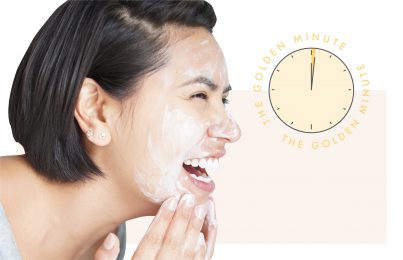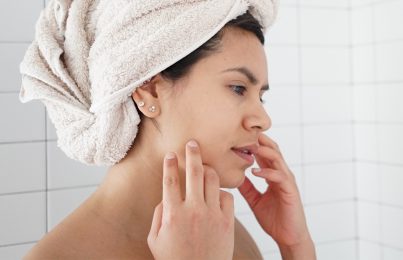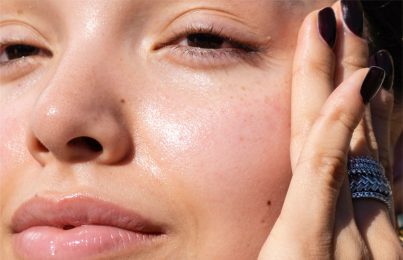Updated 10/18/22. If your skin is feeling dry, tight, and irritated, there is an underlying problem—your moisture barrier is damaged. When people learn this, their first instinct is to layer on a heavy moisturizer, but that won’t fix it. Chances are that you’re doing something day in and day out that’s causing it to stay damaged. The moment you identify (and remove) the culprit, your moisture barrier will naturally repair itself.
Keep reading to learn everything you need to know about your moisture barrier, including what it is, how it works, and what might be damaging it. Plus, learn my expert solutions. You’ll be back to having soft, healthy-looking skin in no time.
What Is a Moisture Barrier?
The moisture barrier is the outermost layer of the skin that helps retain water and provides protection from external aggressors, like bacteria and environmental debris. Think of it like your skin’s personal bodyguard, which helps keep the good in and the bad out. It’s made up of lipids (oils) that bind your skin cells together. When it’s intact, it’s responsible for keeping the skin feeling soft and smooth. When the moisture barrier becomes damaged, small, invisible cracks appear. Through these cracks, moisture can easily escape and irritants can easily enter. The skin may start to feel tight, dry, and sensitive. Essentially, it’s like your skin lost its protective bodyguard.
How Can I Tell If My Moisture Barrier Is Damaged?
As an esthetician with over 30 years of experience, I can say that almost every single skin concern can be traced back to a damaged moisture barrier. In fact, not a day goes by that I’m not pinpointing a damaged moisture barrier as the underlying cause of someone’s skin issues.
Common signs of a damaged moisture barrier include redness and rosacea, dryness and dehydration, flakiness and peeling, irritation, itchiness, roughness, a stinging or burning sensation when products are applied, and increased breakout activity. If you experience any or all of these things, no matter your age, you might have a compromised barrier. If that’s the case, keep reading to learn how to fix it.
What Causes a Moisture Barrier to Become Damaged?
There are many different things that can damage your moisture barrier. It could even be a combination of factors, which is why it’s important to be attentive to your skin, as well as your skincare routine and lifestyle habits, to pinpoint the culprit(s). Here are some common causes of damage:
- Over-exfoliation (this is the most common one I see)
- Using drying skincare products (such as alcohol-based toners and high-foaming cleansers)
- Using acidic skincare ingredients (like certain forms of vitamin C)
- Washing the face with hot water
- Skipping the use of moisturizer
- Too much sun exposure
- Prescription retinoids
- Dry climates and air conditioning
- Using certain skin devices, such as a dermaroller
- Medications that list dryness as a side effect
- Genetics (Some skin types are naturally susceptible to a weak moisture barrier)
- Aging (the moisture barrier becomes more vulnerable after age 45)
8 Ways to Fix a Damaged Moisture Barrier
You haven’t done permanent damage if you’ve been overdoing it with exfoliation for a short period of time. In that case, it’s easily fixable. However, some damage has occurred if you’ve been using harsh products and over-exfoliating for years. Especially if that has gone hand-in-hand with sun exposure. The good news is that it’s never too late to get the skin back to a better place. If you’re making positive changes, I can assure you that you’ll see an improvement. Read on for 10 ways to fix a damaged barrier!
1. Care for Your Skin the Way You Would a Baby’s Skin
If your skin is acting unusually sensitive, a good mindset to have is to care for your skin like you would a baby’s skin. This means keeping everything simple and gentle until it feels back to normal. Go back to basics and lay off potentially irritating active ingredients for some time.
2. Cut Back on Exfoliation
Now that exfoliating products are so popular, many people use them daily. This is hands down one of the biggest and most common contributors to a damaged moisture barrier. When you exfoliate too often, you’re stripping your skin’s protective barrier, which all but guarantees that moisture will escape. This can set off a cascade of inflammation, which not only leads to that uncomfortable dry, tight feeling but also contributes to skin aging.
When you’re trying to fix your moisture barrier, I recommend laying off all exfoliating products for two weeks. Slowly work them back in once your skin feels better. When you reintroduce them into your routine, don’t use them every day. Instead, use them four to five times a week depending on your skin type.
Read my beginner’s guide to exfoliants
Note: If you use a prescription retinoid, know that it works, in part, by breaking down your barrier. While I don’t suggest that anyone stop using one, mainly because it’s so great for getting the skin to look and act younger, I do have some recommendations for how to lessen negative side effects. Read my beginner’s guide to retinol and prescription retinoids.
3. Use a Gentle Cleanser
When fixing a damaged moisture barrier, you’ll want to switch from a foaming cleanser (even if it’s gentle and sulfate-free!) to a cleansing lotion. These cleansers are generally much milder, which is important for dry, tight, or irritated skin.
Read nine surprising cleansing mistakes you need to stop making.
4. Avoid Washing Your Face With Hot Water
Hot water dilates capillaries and raises the skin’s internal temperature. It can also impair the skin’s moisture barrier. That’s why it’s best to use lukewarm water to wash your face—especially in the winter months when the barrier is typically the most fragile.
5. Wear Sunscreen
Sunscreen is the ultimate product for defending your skin from one of the worst sources of environmental damage—the sun. The UVA and UVB rays that are given off by the sun will only contribute to a damaged moisture barrier. That’s why it’s so important to apply sunscreen generously and consistently, rain or shine.
Read this is how much sunscreen you should actually be wearing.
6. Choose a Moisturizer That Contains Specific Ingredients
Moisturizers can certainly aid in fixing a damaged moisture barrier, but it’s important to use those that contain ingredients that mimic the natural lipids found in the skin. And remember, just because a moisturizer feels heavy and greasy doesn’t necessarily mean it will be the best for fixing your moisture barrier. It’s all about the ingredients.
The ingredients I recommend are borage, evening primrose, cranberry, sunflower, soybean, safflower, jojoba, and sweet almond oils. You can also look for ingredients such as niacinamide, ceramides, phospholipids, squalane, vitamin E, phytosterols, and shea butter. All of these can help support a damaged moisture barrier.
Note: You might be looking at some of the above ingredients and think they’d make a rich, greasy moisturizer. That is not the case. A moisturizer can include these ingredients without being heavy and pore-clogging. It all depends on the percentages that are used and the oil-to-water ratio in the formula. Read more about what makes ingredients pore-clogging in this post.
7. Use an Essence
All skin types need water, but when you’re trying to fix your moisture barrier, it’s even more important. After all, when your moisture barrier is damaged, it lets water escape your skin through a process called transepidermal water loss.
One of my favorite ways to deeply hydrate the skin is by using an essence. These products are similar to toners, but they’re serum-infused with water-binding ingredients. They often have a slippery gel-like texture rather than a watery one. My favorite one to use is the Moisture Infusion Toner. It includes phospholipids, moisturizing skin oils, and niacinamide to help strengthen and support the moisture barrier.
Here’s how I recommend using it. Start by washing your face with a cleansing lotion. Then, apply a generous amount of the Moisture Infusion Toner to a Toning Cloth and wipe it over your face. Next, pour a quarter-sized amount into the palm of one hand. Pat the product all over your face using the fingertips of your other hand. Repeat this two more times. Afterward, your skin should feel cool and plump. To finish, seal it in with a serum and moisturizer. I recommend performing this technique twice a day for one to two weeks (although you can certainly make it a year-round habit for hydrated skin).
No matter if you’re using a traditional toner or an essence, apply it within 60 seconds of cleansing. Doing so will prevent water loss. I call this the Golden Minute Rule, and it’s very effective for keeping the skin nice and hydrated.
8. Use Face Oil (the Right Way)
Whenever my clients are in need of a serious fix, I always recommend they use a well-formulated face oil, like Pro Remedy Oil. I suggest patting it over moisturizer as the last step in their nightly skincare routine. This will provide a protective seal over the skin so everything that’s underneath is less likely to evaporate.
Read how to use face oil the right way.
How Long Does It Take to Fix a Damaged Moisture Barrier?
If you’re eliminating the things that are causing damage, and you’re investing in the right products to correct it, you should be able to fix your moisture barrier within two to four weeks. For some people, it could be quicker. The skin is truly incredible in that it’s always working to address whatever stressors come its way. That’s why you want to work with it, not against it.
There is really no reason anyone should suffer from dry, tight, or irritated skin. It’s truly an easy fix if you have the right products. If you’ve been struggling with a damaged moisture barrier, I recommend trying the Barrier Restoring Kit. I created it for this exact reason, and it contains three of my favorite nourishing products to get your skin back on track, fast.
I hope you found this post helpful. I also hope your skin will return to a smoother, calmer, and more hydrated state soon.
Next, read up on five skincare mistakes everybody makes (and how to correct them!).
Celebrity Esthetician & Skincare Expert
As an esthetician trained in cosmetic chemistry, Renée Rouleau has spent 30 years researching skin, educating her audience, and building an award-winning line of products. Her hands-on experience as an esthetician and trusted skin care expert has created a real-world solution — products that are formulated for nine different types of skin so your face will get exactly what it needs to look and feel its best. Trusted by celebrities, editors, bloggers, and skincare obsessives around the globe, her vast real-world knowledge and constant research are why Marie Claire calls her “the most passionate skin practitioner we know.”




Comments:
Hello !! I use accutene for 3 months to clear my acne my acne are cleared but my skin is so senstive now and senstivity to heat and products even plan water wash make my skin itchy and have bumps on skin redness also wirnkles geeting on face am 21 years old please help😭😭😭😭
Posted By: Ume kalsoom |
Hi! Check out our Moisture barrier restoring kit! This will help you get your skin back on track!
Posted By: Renée Rouleau |
Hi Ume! You may have a compromised barrier, check out our Barrier restoring kit!
Posted By: Renée Rouleau |
I have damaged skin barrier.Now, i am using cerave hydrating facial cleanser, rovectin treatment lotion, cerave moisturizing cream & rovectin aqua soothing sunscreen.Rovectin treatment lotion contains papaya extract(enzyme exfoliator).Should i continue using that treatment lotion??
Posted By: hnin |
What can I use underneath the eyes when you dealing with damaged skin barrier?
Posted By: Dshaylia |
A simple hydrating eye cream, like Total Eye Repair, is your safest choice when the skin around the eye is feeling stressed.
Posted By: Renée Rouleau |
hello,I am a 18 year old guy.I used to have a really oily skin but due to stupid habits like exfoliating too much,washing face with hot water,not applying moisturizer, it has become super dry.tight and sensitive.Can you recommend some moisturizer to repair my skin moisture barrier,keeping in mind that it is acne prone and I have acne currently.
Posted By: jjj |
Hi there! Sheer Moisture Lotion and Pro Remedy Oil are the most hydrating layers for acne-prone skin in my line. Give those a go!
Posted By: Renée Rouleau |
hi mam,
I am a 18 year old guy,I used to have a really oily skin but due to my stupid habits like exfoliating too much, washing my face with excessive hot water,not applying moisturizer it has become super dry,tight and sensitive for quite a time now.Can you recommend some moisturizer to help repair my skin,keeping in mind that it is acne prone.
Posted By: john cena |
Hello! Sheer Moisture Lotion and Pro Remedy Oil are the most hydrating layers for acne-prone skin in my line. Give those a go!
Posted By: Renée Rouleau |
How does a damage moisture barrier on nose and forhead looks like. My nose is red,flaky looks dry ,bumpy and producing more oil then usual. My forhead center is red, with tiny bumps, looks dry and wrinkly? My forhead never been senstive but now it get red when I touch it?
Posted By: Marcelina |
Since you are describing a number of signs of barrier damage it is safe to assume you could use a little more hydration. Try one or two of the suggestions described in the post and if you don’t see any improvements it might be time to check in with a derm!
Posted By: Renée Rouleau |
I have rosacea and right now I guess I’m in a “flare”. It burns and stings non stop cuz silly me tried out a BHA and lactic acid for my mature skin and now i am suffering. I 100% believe in HYDRATION and if one more person tells me to use Vaseline im going to scream. I tried it and broke out terribly and I’m 53! Was it fun. Im using HA but have been trying to find an essence like you talked about for HYDRATION. what are your best recommendations for an essence AND in your opinion what are the best moisturizers for dry skin and rosacea. Ty so kindly.
Posted By: Leanne |
You will love the Moisture Infusion Toner for a hydrating essence! Since your skin doesn’t do well with highly occlusive ingredients like petroleum jelly opt for something with more water-based hydration, such as the Hydraboost Rescue Creme. Happy hydrating!
Posted By: Renée Rouleau |
I need help. I had went to 2 dermatologist and I just feel like they don’t care. So on February I meant with my first one and see prescribed me finacea gel to put on my acne spots. Morning and night and this was my first time ever using a prescription .( I used it all over my face) It started off good and then my face was getting red and dry! I used it feb-april on April I stopped and was trying to find whatever cleanser and moisturizer will help with the dryness and redness. 1 month passes by I started to get bumps on my forhead It looks oily, and dry and I notice some wrinkles. I went to a second dermatologist on June and she gave a retionod that only lasted for two weeks becuase my face looked so red like I got a sunburn. And my skin was producing so much oil,it was itchy,and dry no matter what moisturizer I use. Does this sound like I messed up my moisture barrier becuase I feel like I did. Any tips?
Posted By: Marcy |
Hello! Since you used the prescription spot treatment as an all-over serum you may want to talk to that doctor again about if your results would be different had you used it as directed.
Posted By: Renée Rouleau |
Do you have any specifics of those products that you could recommend?
Posted By: nikki |
The Pro Remedy Oil is a great barrier restorer for most skin types! Give that a go!
Posted By: Renée Rouleau |
I went on a pill which gave my acne and I’ve switched to a pill which helps clear acne now, but my chin/jaw/around my mouth has been gradually breaking out more… and more and its not getting better.
I was using a LOT of actives like- inkey BHA, Cerave SA cleanser, alpha arbutin, Benzoyl peroxide and sometimes retinol (all on diff days).
I only used those ingredients on my problem area so I think my moisture barrier (MB) is only damaged there as its the only part of my face thats red, flaky, sensitive, and feels rough… should I just use no actives and keep moisturizing for 2 weeks ? I have actives spots and more that keep popping up everyday it feels wrong to not treat them cause they last a while too now (I’m trying not to pop them).
To fix my MB I’m using:
1. the Cerave hydrating cleanser
2. Rosehip or hemp seed oil, (Lineoic acids and oil production)
3. azaelic acid cream(for pigmention),
4. Cosrx snail mucin moisturize
5. La Roche Posay Cicaplast B5 recovery balm
6. Either Inkey mineral spf or centella spf…. would you say thats a good routine (morning and night)?
Also… i tried using inkey list niacinamide and i swear it made me more flaky and dry… i removed it from my routine but i only used it morning and night for 1 day, should I add it back in?
Posted By: Andrea |
The best path forward in your routine will vary with the types of breakouts and breakout frequency you are seeing with your skin. I would suggest booking a My Skin Rx Virtual Consultation with one of my on-staff estheticians to help you orchestrate your complex routine for the best results. You can learn more about My Skin Rx here: https://www.reneerouleau.com/pages/spas-virtual-consultations
Posted By: Renée Rouleau |
Thank you for this! I’ve spent a few of hours now reading all I can on this blog. I’m pretty sure my barrier is significantly damaged, due to: years of heavy benzoyl peroxide usage; undiluted tea tree oil; chemical peel (w/o halting retinol usage beforehand) resulting in intense redness and sensitivity; and continued retinol usage, to name the top factors. My skin is perpetually and deeply inflamed, itchy, dry, sensitive, and flaky, despite covering it in oil (jojoba, prickly pear, rosehip, SkinBae, True Botanicals, etc – though not all simultaneously).
My skin is also heavily purging from a recent and continued cleanse. I have deep cystic acne along chin and, and clogged pores (bumps, white heads, and blackheads).
I assume I first restore the barrier (using steps below), then treat blemishes, then later incorporate retinol? Do you have guidance on what products to use first? I tried doing my due diligence before asking, but want to confirm. Thank you so so much
Posted By: Whitney |
I am so happy you found the blog! The best path forward in your routine will vary with the types of breakouts and breakout frequency you are seeing with your skin. I would suggest booking a My Skin Rx Virtual Consultation with one of my on-staff estheticians to help you orchestrate your complex routine for the best results. You can learn more about My Skin Rx here: https://www.reneerouleau.com/pages/spas-virtual-consultations
Posted By: Renée Rouleau |